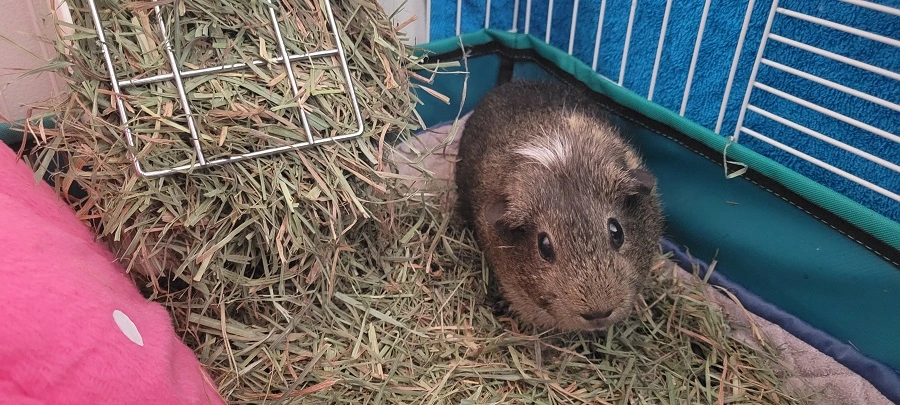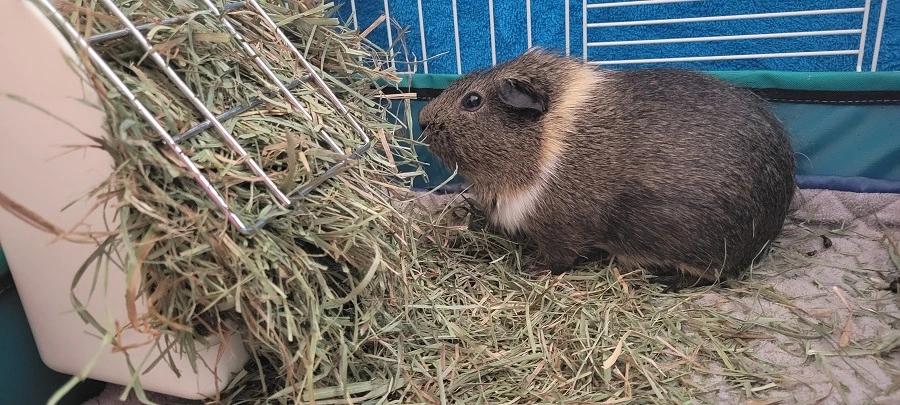Thinking about welcoming a cuddly guinea pig into your family? These small pets have specific needs, especially when it comes to their diet – a crucial part being access to hay daily. Fantastic! These adorable and quirky little creatures make wonderful companions, but their unique needs require dedicated care.
One crucial element? Hay! It’s not just a snack – it’s the lifeblood of their digestive system and overall health. So, the question begs: can guinea pigs go without hay? The short, nail-biting answer is no, not for long. In this article, we’ll delve into why hay is essential and how long your furry friend can safely go without it.
How Long Can a Guinea Pig Go Without Hay?
Related Article: Guinea Pig Care Guide: Must-Knows for New Owners
The truth is stark: how long can guinea pigs go without hay? Not more than 24 hours without hay is the absolute maximum tolerable period, and even that pushes the boundaries. For young or sick guinea pigs, even a few hours without hay can be risky, potentially leading to digestive problems and other health complications. You always have to have hay available for your cavy.
Never, ever intentionally deprive your guinea pig of hay. It’s not just food; it’s their lifeline. Think of it like gasoline for a car – without it, their entire system grinds to a halt. Remember, prioritizing a constant supply of high-quality hay is the bedrock of your guinea pig’s well-being.
The Powerhouse Food They Can’t Live Without
Hay isn’t just food; it’s an essential source of nutrition and digestion aid for your guinea pig – a complete ecosystem for their tiny bodies. Let’s explore why it’s so essential:
Why Hay is Essential
- Fiber Frenzy: High in fiber, hay acts like a tiny broom in your guinea pig’s gut, keeping things moving smoothly and preventing blockages. Without it, food can get stuck, leading to potentially fatal gastrointestinal stasis. This aligns with Dr. Emma Keeble’s findings, emphasizing hay’s crucial role in maintaining both dental and gastrointestinal health in guinea pigs.
- Dental Delights: Imagine tiny teeth chomping away, keeping themselves in check! Hay naturally wears down their ever-growing teeth. This prevents painful malocclusion, where teeth can overgrow and misalign. Keeble’s research further supports this, noting that diets high in forage and silica content are more abrasive, thus promoting better dental health.
- Nutritional Oasis: This leafy snack isn’t just tasty, it’s packed with vital nutrients! Hay contains Vitamin C, calcium, and essential minerals. These nutrients keep your furry friend’s bones strong. They also keep its immune system robust and overall health thriving. Keeble’s paper highlights the unique requirement of guinea pigs for vitamin C in their diet, due to their inability to synthesize it.
- Happy Gut, Happy Guinea Pig: Beyond digestion, hay promotes gut health by maintaining a balance of good bacteria. This prevents bloating, gas, and other gastrointestinal issues. It keeps your guinea pig feeling comfortable and content. The paper corroborates this, underlining the importance of a good quality diet for overall health and well-being.
Choosing the Right Type of Hay
Not all hay is created equal! Here’s what to look for in your guinea pig’s fuel:
- Timothy Hay: The king of guinea pig diets, boasting optimal fiber content and low dust. Aim for “2nd cut” Timothy hay for longer, stemmer strands that wear down teeth even more effectively.
- Orchard Grass and Meadow Hay: Good alternative options, but offer them alongside Timothy Hay as they are slightly lower in fiber.
- Alfalfa Hay: High in calcium, this hay is best reserved for young guinea pigs, pregnant or nursing moms, or as an occasional treat for adults.
Table: Nutritional Components of Hay and Their Benefits for Guinea Pigs
| Nutritional Component | Benefit for Guinea Pigs |
|---|---|
| High Fiber Content | Essential for digestive health, prevents gastrointestinal stasis |
| Natural Abrasives | Promotes dental health by wearing down continuously growing teeth |
| Low Calorie | Helps in maintaining a healthy weight, preventing obesity |
| Vitamin C and Minerals | Supports immune system health, bone strength, and overall well-being |
Remember, freshness is key! Choose clean, green hay, free from dust or mold. And speaking of plenty, aim for an unlimited supply in multiple racks throughout the cage. Replace leftover hay regularly to keep things fresh and tempting.
Feeding Tips
Hay isn’t just a meal, it’s a constant companion! Provide several racks filled with fresh hay throughout the cage, ensuring your guinea pig can munch and chomp whenever they please. Replace hay regularly to maintain its freshness and nutritional value. Remember, happy munching means a happy and healthy guinea pig!

Consequences of Hay Deprivation: A Ticking Time Bomb
Without the magic of hay, even a sick guinea pig can’t go without hay for long, as their well-being is at risk. Let’s delve into the dangers of hay deprivation and why it’s crucial to prioritize this vital food source:
Digestive Complications
Hay’s fiber acts as a tiny internal lawnmower, keeping the digestive system running smoothly. Deprived of this essential fiber, food can get stuck, leading to a potentially fatal condition called gastrointestinal stasis. Imagine their gut grinding to a halt – a terrifying situation for both you and your furry friend.
Symptoms of Stasis: Watch out for warning signs like lethargy, decreased appetite, bloating, and abdominal pain. If you suspect stasis, immediate veterinary care is critical. Don’t wait for things to worsen, as stasis can quickly become life-threatening.
Beyond Digestion
The consequences of hay deprivation extend far beyond just the digestive system. Consider this:
- Malnutrition and Weight Loss: Lack of essential nutrients weakens the immune system, leaving your guinea pig vulnerable to illness and hindering their ability to fight off infections. Weight loss can also occur due to the lack of proper nourishment.
- Dental Issues and Malocclusion: Without hay to wear down their teeth, overgrowth and misalignment become major risks. This can lead to painful malocclusion, where teeth can protrude and cause difficulty eating.
- Stress and Behavioral Changes: Imagine feeling constantly hungry and uncomfortable. Hay deprivation can cause stress and anxiety in your guinea pig, manifesting in behavioral changes like aggression, withdrawal, and decreased activity.
Hay is not just food; it’s the foundation of your guinea pig’s well-being. Don’t underestimate its importance. In the next section, we’ll explore emergency alternatives for those rare situations where hay might be temporarily unavailable, along with additional essential care tips to keep your furry friend happy and healthy.
Emergency Situations and Alternatives: Don’t Panic, Improvise!
Life throws curveballs, and even the most dedicated guinea pig parent might face a temporary hay shortage. While ideal, avoiding such situations is key, remember that unforeseen circumstances do occur. So, what can you do in a pinch?
Temporary Alternatives (with Caution):
- Fresh Grass: Pesticide-free and washed fresh grass can be offered in small amounts as a stopgap measure. Never rely on it as a long-term solution.
- Leafy Greens: Romaine lettuce, kale, and parsley can be sparingly provided, but be aware they can cause diarrhea in some guinea pigs. Always prioritize hay if available.
Important Warnings:
- Never rely on pellets as a long-term hay substitute! Pellets lack essential fiber and can contribute to weight gain.
- If you know you’ll be away for an extended period: Arrange pet care or invest in an automatic hay feeder to ensure a constant supply.
The Golden Rule: Always prioritize hay and only use alternatives as a temporary last resort. If in doubt, seek help from trusted sources like your veterinarian or experienced pet sitters. Remember, your guinea pig’s health is your top priority!
Essential Care Beyond Hay: A Holistic Approach
Hay is the cornerstone, but remember, it’s just one piece of the puzzle. For a thriving and happy guinea pig, provide a holistic care approach:
- Fresh Water: Access to clean water is vital at all times.
- Balanced Pellets: Choose high-quality pellets formulated for guinea pigs.
- Clean Cage: Regularly clean and disinfect the cage to prevent illness.
- Social Interaction and Playtime: These social creatures thrive on daily interaction and playtime.
- Vet Checkups: Schedule regular vet checkups to monitor their health and ensure they’re thriving.
By prioritizing hay, alongside these essential elements, you’ll be creating a haven of health and happiness for your furry friend. Remember, their well-being is in your hands. Make it a priority to provide them with the best care possible!
Related Article: Beyond the Orchard: Can Guinea Pigs Eat Apples?
Conclusion
Remember, hay isn’t just a snack; it’s the lifeblood of your guinea pig’s well-being. From smooth digestion and healthy teeth to vibrant energy and a happy gut, this leafy wonder powers their entire system. Make hay the cornerstone of their diet, prioritizing a constant supply of fresh, high-quality goodness.
Think of yourself as a hay gardener, lovingly tending to their leafy Eden. With dedication and a commitment to optimal care, you’ll witness the joy of a thriving guinea pig – a testament to the love and responsibility inherent in welcoming these adorable furry companions into your life. So, keep the hay flowing, let the chomping commence, and embrace the endless cuddles – your guinea pig’s happy life starts with a single strand of hay.

